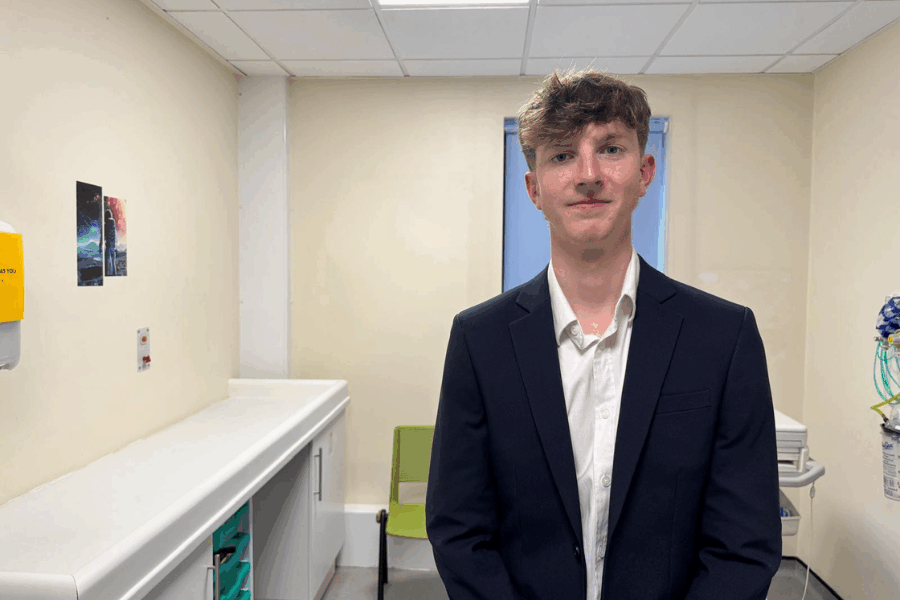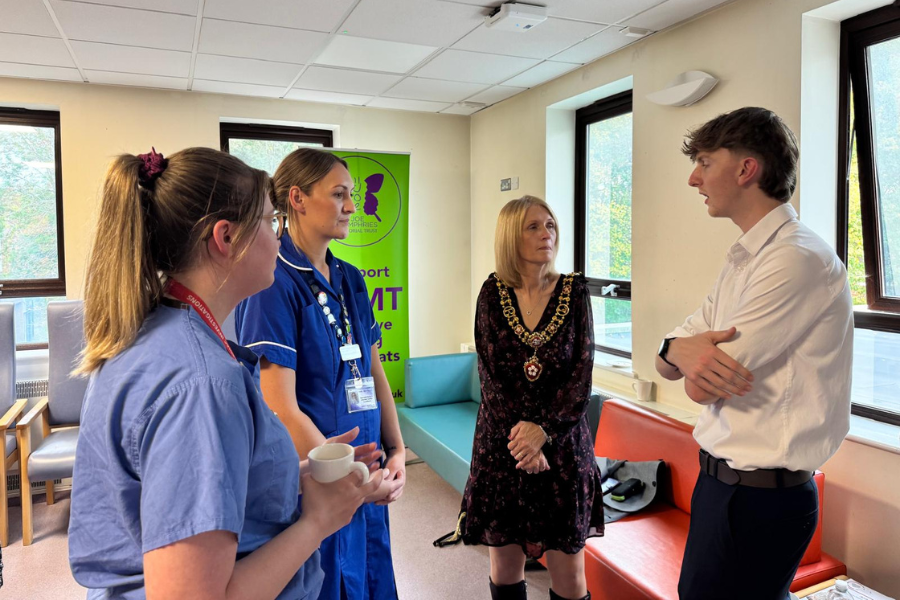
An 18-year-old triathlete who suffered a cardiac arrest whilst at the gym has shared his experience and thanked clinicians and the Joe Humphries Memorial Trust for saving his life.
Harry Edwins, spent three weeks in hospital after a cardiac arrest in October 2024 and became one of the first people in the East Midlands to be fitted with an extravascular implantable cardioverter-defibrillator (EV ICD).
He said: “It’s thanks to the Inherited Cardiac Condition team that I now able to live a relatively normal life and I’m starting to get back into sport again. The cardiac team have been amazing in supporting me through my journey. The implant means that the doctors and I can monitor my heart 24 hours a day.”
Harry shared his story with the Lord Mayor of Leicester, Cllr Teresa Aldred, during a visit to the University Hospitals of Leicester NHS Trust (UHL) on Thursday 2 October.

The visit to the Inherited Cardiac Condition (ICC) Clinic at the Glenfield Hospital marked Sudden Arrhythmic Death Syndrome (SADS) Awareness Week. The week raises awareness of SADS – the sudden and unexpected death of a teenager or adult, usually linked to an inherited heart condition.
In March 2025, after extensive testing, Harry was diagnosed with Catecholaminergic Polymorphic Ventricular Tachycardia (CPVT) a rare, inherited heart rhythm disorder that causes fast heartbeats during physical or emotional stress due to improper calcium regulation in the heart’s cells.
He added: “The Lord Mayor’s visit today means that I have been able to share my story with her and show first-hand how the ICC team and the Joe Humphries Memorial Trust partnership is saving lives like mine.”
The Lord Mayor spoke with staff to understand how the service provides specialist care for patients and their families, including genetic testing, lifestyle advice and counselling, all designed to prevent sudden cardiac events. The team works across cardiology, paediatrics and genetics to ensure patients and relatives receive joined-up care.
Dr Harshil Dhutia, consultant cardiologist and clinical lead for inherited cardiac conditions service at UHL, said: “We are incredibly grateful to Harry for sharing his experience. His story highlights why this service is so important, helping us detect hidden risks, provide treatment, and save lives. It’s thanks to our partnership with the Joe Humphries Memorial Trust that we were able to launch this service two years ago, which supports patients and their families with inherited cardiac conditions. Visits like this give us the chance to showcase the positive impact we are making to improve outcomes for our patients.”
The visit forms part of the Lord Mayor’s support for her chosen charities during her civic year, which includes the Joe Humphries Memorial Trust. The Trust was set up in memory of 14-year-old Joe Humphries, who died from SADS in 2012. Since then, his family and friends have worked tirelessly to campaign for a better understanding and awareness of sudden, unexpected death in young people (SADS).
The Lord Mayor, Cllr Teresa Aldred, said: “I was delighted to visit the Inherited Cardiac Condition Clinic and find out more about the vital work they do to reduce the risk of sudden heart deaths. Meeting the clinicians and staff who work so hard and hearing from patients who have benefitted from their help, it is easy to see how valued this service is, and I am very proud to be supporting this work during my year in office.”
The Joe Humphries Memorial Trust works in partnership with the ICC service to promote education and awareness around SADS to both health care staff and local communities, as well as providing support for families through, training, counselling, funding community defibrillators and screening initiatives.
Steve Humphries, Chair of the Joe Humphries Memorial Trust, said: “We are delighted to see the extent to which the ICC service has grown and developed, which clearly demonstrates the need for a one-stop service. Families need to learn quickly if anyone in the family could be affected, as most of these conditions are genetic. Harry’s powerful story highlights how important it is for as many people as possible to be trained in CPR and know how to use a defibrillator.”